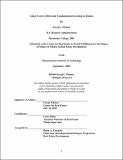Ghost towers : distressed condominium investing in Atlanta
Author(s)
Whalen, Faraji L
DownloadFull printable version (1.339Mb)
Alternative title
Distressed condominium investing in Atlanta
Other Contributors
Massachusetts Institute of Technology. Center for Real Estate. Program in Real Estate Development.
Advisor
Lynn Fisher.
Terms of use
Metadata
Show full item recordAbstract
The purpose of this paper is to explore investment opportunities in these now-distressed residential condo properties. The paper will characterize the economic and development environment to determine the extent of overbuilding and forecast future behavior amongst market participants. It will assess the behavior of bulk condo investors in previous downturns to assess both similarities and differences in the environment, and identify best practices in investment and asset management. Additionally, the paper will characterize the legal and management risks inherent in this type of investment. The paper will conclude that there are a number of different strategies for investing in bulk condos and their underlying debt. One of the hardest hit markets is Atlanta, Georgia, which is the focus of this paper. Each of these strategies is contingent on the type and expertise level of the individual investor, but there are certainly going to be appropriate avenues for investors to create value both from the physical asset and from purchasing debt. Atlanta is likely going to be an excellent market to pursue these deals because of unique localized factors including extraordinary state distress, low asset pricing, and limited competition. The findings in this paper conclude that distressed condominium investing is an extremely localized business, and the recommendations made in this paper are specific to Atlanta. While an investor may use the paper as a guide for investment in other locales, it would not be appropriate to use a cookie cutter approach in every city. There are also many risks and a great deal of unknowns in the bulk condo space. (cont.) This downturn differs significantly from past real estate crises because of the complexity of the financial instruments used to fund condo projects as well as a completely different government response. It is clear that the government response up to this point has been as much of a hindrance as it has been a help. Government action must engage investors in financial instruments in a more predictable manner, and assure they will not engage in punitive legislative behavior to investors who profit from this crisis.
Description
Thesis (S.M.)--Massachusetts Institute of Technology, Program in Real Estate Development in Conjunction with the Center for Real Estate , 2009. This electronic version was submitted by the student author. The certified thesis is available in the Institute Archives and Special Collections. Cataloged from student submitted PDF version of thesis. Includes bibliographical references (p. 55-57).
Date issued
2009Department
Massachusetts Institute of Technology. Center for Real Estate. Program in Real Estate Development.; Massachusetts Institute of Technology. Center for Real EstatePublisher
Massachusetts Institute of Technology
Keywords
Center for Real Estate. Program in Real Estate Development.